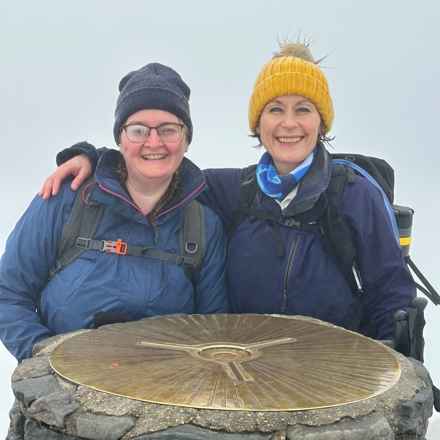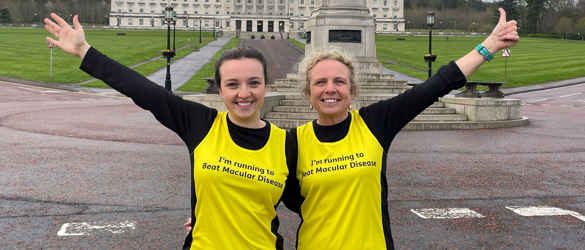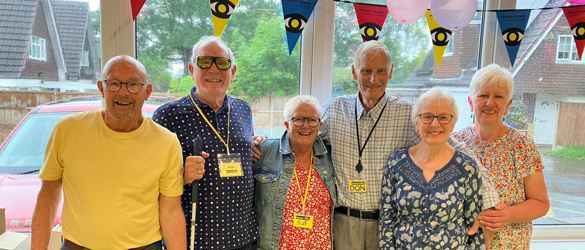Friends take on epic mountain challenge to beat macular disease
Posted: Tuesday 01 April 2025
From Yorkshire to Tanzania, two friends who spend their working lives treating people with macular disease are taking on a series of epic mountain climbs in 2025, raising funds to find a cure.
Cath, an orthoptist and advanced practitioner in ophthalmology, will be taking on Ben Nevis and the Yorkshire Three Peaks, in preparation for a trek up Mount Kilimanjaro in May, in an effort to Beat Macular Disease.
She will be joined by ophthalmic nurse Shenay for the climb to help raise funds for the Macular Society’s research programme and raise awareness of macular disease.
The challenge is also a personal one for Cath after her mum Penny was recently diagnosed with pattern dystrophy – a rare macular condition.
Cath, 47, said: “At the beginning of 2024 Shenay and I genuinely thought that we could actually do this and, as we had been planning it, my mum then started to have some more visual problems.
“She phoned me and said it was like everything had collapsed in on itself, everything was distorted.”
Future risk of macular disease
Penny was originally diagnosed with dry age-related macular degeneration (AMD) but scans last year confirmed she had pattern dystrophy. Her sight loss followed on from her own mum and grandmother, who had lived with visual problems in later life.
Cath, who qualified as an orthoptist in 1999 before transitioning into macular-specific treatment, said: “It’s hereditary so I was thinking well that’s me, my sister, my children who could be facing this. That inspired me to want to help put something towards macular research; probably something that might not help me but for the longer-term future, be that gene therapy or breakthroughs for hereditary pattern dystrophies.”
A positive, "can-do" attitude
Cath hailed her mum’s can-do attitude, especially while she can still drive and retain her independence. But, she has seen how sight loss has affected her mum’s love of reading.
She said: “It’s been pretty devastating to see this happen to mum. She was an English teacher and she still likes to read an awful lot. Sadly, that has now become a real struggle. That’s heartbreaking to me, because she has devoted her life to books and literature, so that must be so hard. She’s not the kind of person who embraces technology very readily either, she’s very much a traditionalist.
“All this also makes me wonder is this what I’m going to be signed up for as well. I talk to patients all the time, and I can separate myself from it when I deliver them messages and arm them with information, but at the same time there’s now that emotional element inside me thinking ‘this could be me, my sister or my children’. It certainly hits home a bit, and that is quite hard.”
Climbing Mount Kilimanjaro
The climb up Africa’s largest mountain will see Cath and Shenay tackle various climates, including sub-zero temperatures.
“It’ll be pretty epic and even with all the training we’re doing, it doesn’t quite prepare you for it,” said Cath. “Obviously there is the altitude too, as well as the risk of sickness, but every time I've got a free day, I just think, ‘where can I go for a walk now, what can I do?’ It’s constantly on my mind.
“We’re really looking forward to it. I’m kind of terrified too, but it’s exciting and I’m keen to get up there and reach the top.”
And Cath is determined to keep fundraising for a cause which is so close to her heart.
Why fundraising is important for macular research
“Fundraising is one of the only ways we can fund research,” she said. “It goes a long way on a practical level to providing support but also it’s about funding possible new treatments, be that testing out eye drops or gene therapy, and we know there are all kinds of things on the horizon that just need that bit of cash to help us look into them. It’s why fundraising to find this money is so important.
“Perhaps it will be possible that in the future there could be one injection needed to stabilise someone’s eyes. Who knows? There are all kinds of possibilities, especially with the progression of AI and detecting changes earlier, even changes more subtle than what the human eye can see.
“Funding helps to make all these sorts of things possible. It would be the dream to be able to cure macular disease - that would be amazing -but better early detection and new or different management treatments is the first really good step to helping people living with these conditions.”
Cath and Shenay are welcoming donations on their JustGiving page.
Help us to Beat Macular Disease
Take on a challenge event
Find out about sporting events and other challenges you can take part in to Beat Macular Disease.
Do your own fundraising
Want to raise money in your community to Beat Macular Disease? Whether you’re looking for ideas or how to get started - we’ve got everything you need.




